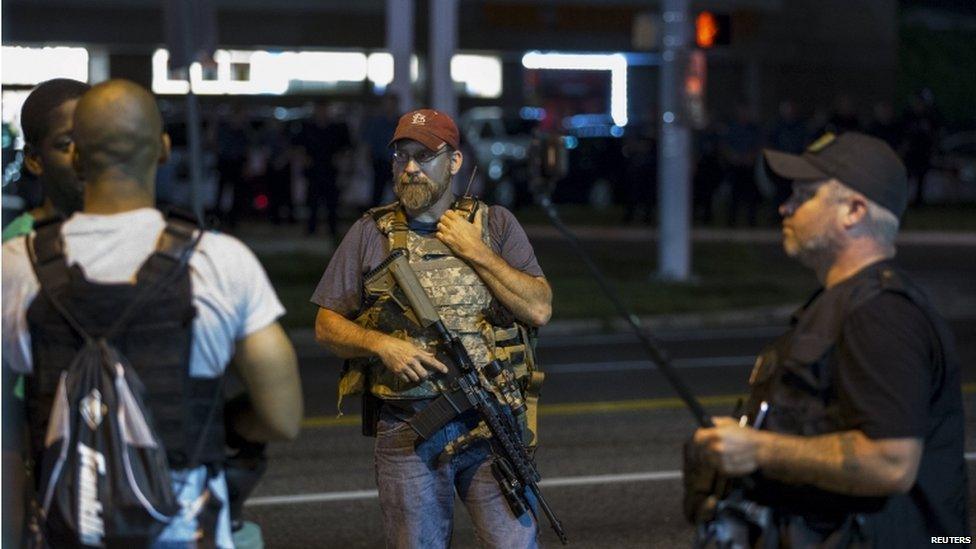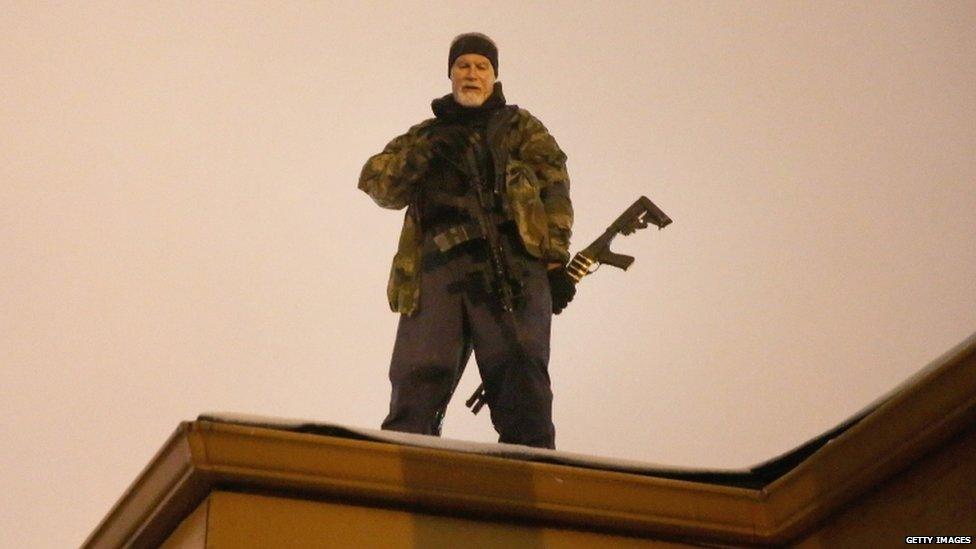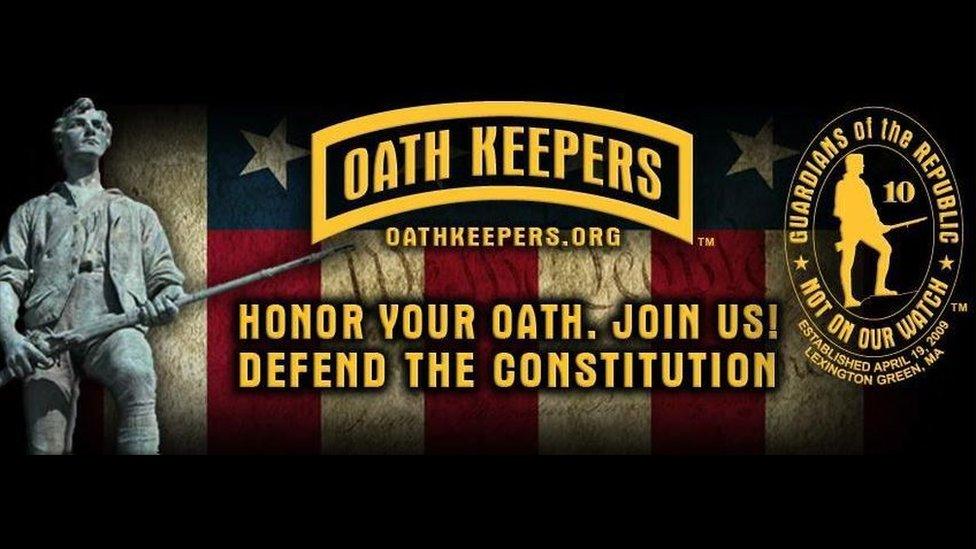Ferguson unrest: Who are the mysterious 'Oath Keepers'?
- Published

As the events marking the anniversary of Michael Brown's death descended into violence in Ferguson this week, a handful of heavily armed white men were spotted patrolling the St Louis suburb - much to the ire of protesters.
Dubbed by the media as right-wing vigilantes, they belong to a controversial group called the "Oath Keepers" which has pledged to "defend the constitution against all enemies, foreign and domestic".
It is not the first time they have stepped into the fray in Ferguson, appearing on rooftops when protests erupted there in November following the grand jury decision not to indict the white police officer who shot dead Michael Brown.
'Guardians and defenders'
Founded in 2009, the Oath Keepers group says it is reaching out to both current and former military, police, and first responders "to teach them more about the Constitution they swore to defend, and to inspire them to defend it".
It describes itself as a non-partisan association, telling members not to obey "unconstitutional orders". These, its website says, external, include orders to disarm the American people, to conduct warrantless searches, or to detain Americans as "enemy combatants" in violation of their ancient right to jury trial.
It was set up by Stewart Rhodes, a Yale law school graduate, former US army paratrooper and staunch defender of the US Constitution - particularly the second amendment, the right for people to keep and bear arms.
Mr Rhodes told the libertarian journal Reason, external in 2011 that his group's mission was to "persuade the guys with the guns not to violate the Constitution". He denied advocating violence or the overthrow of the government, a criticism mounted by hate watch groups such as the Southern Poverty Law Center, external.

John Karriman, head of Oath Keepers division in Missouri, pictured above the rooftop of a business when violence flared up in Ferguson in November
He says had his organisation existed prior to Hurricane Katrina in 2005, he would have told his members to refuse government orders to disarm New Orleans residents which were issued to deal with widespread looting and vandalism.
An in-depth profile by Mother Jones , externalof the group in 2010 described it as "one of the fastest-growing 'patriot' organisations on the right". Mr Rhodes, it reported, was "fascinated" by the notion that Hitler could have been stopped if German soldiers and police had refused to follow orders.
Composed of current and former military and police officers, the Oath Keepers now claim to have up to 30,000 members, though its critics have questioned this figure.
Return to Ferguson
The mysterious men first appeared on Ferguson rooftops carrying assault rifles after the second wave of protests sparked by the grand jury decision not to indict police officer Darren Wilson in November.
The St Louis Post-Dispatch described a chance encounter, external between an Oath Keeper and Ferguson resident Greg Hildebrand, who spotted the man patrolling on his rooftop. When asked, the man said he was protecting his apartment block and shops.

"Guardians of the Republic - not on our watch," the group's motto reads
"I am in the middle of a difficult spot," Mr Hildebrand told the paper. "I feel a lot better having those guys up on the roof."
John Karriman, the head of the Missouri branch of Oath Keepers, told the BBC they went to Ferguson "because the government promised to guard our people and they didn't".
Police in St Louis, he argues, violated state law in Missouri, external that prevents any government agency from confiscating guns from citizens in times of emergency.
He said his men were at first greeted with hostility from protesters when they went there in November: "People were calling us the KKK [Ku Klux Klan], and we didn't know why."
But, he continued, "after two days we were shaking hands and hugging people as they realised we weren't racists, and we were protecting people sleeping above businesses and apartments".
Reports said the group helped to board up vandalised store fronts, but were later ordered to leave by police who threatened them with arrest for operating without a licence.
Mr Karriman returned this month alongside a handful of heavily armed members donning bulletproof vests when Michael Brown anniversary events turned violent in Ferguson once again.

Earlier this year, Oath Keepers served as armed guards for a gold mine in Oregon that was embroiled in a bitter land dispute with the federal government
He said they were welcomed back when they returned in August to help protect two journalists there following an attack on a St Louis Post-Dispatch reporter several days earlier.
"We engaged with them [protesters] all night, telling them we're there to protect people's rights and make sure they're safe."
But some videos posted on YouTube showed verbal confrontations between Oath Keepers and protesters who were angered by their presence.
One protester was filmed, external asking an Oath Keeper member "If you're armed, why can't the protesters be armed? Doesn't the second amendment apply to them too?"
Another man remarks, "what about protecting black people?", to which the so-called Oath Keeper replied: "All lives matter, sure."
'Inflammatory'
St Louis County Police Chief Jon Belmar, quoted by NBC news, external, said the group's presence was "both unnecessary and inflammatory". The county police department later said it was investigating to see if the men had broken any laws.
One of its critics, the Southern Poverty Law Center, has described the group, external as a "fiercely anti-government, militaristic group" and added its founder Stewart Rhodes to the organisation's list of "extremists".
The group is not openly racist like the KKK, senior fellow at the centre Mark Totok says, but "the idea of sending four or five lilywhite guys to defend a reporter among crowds of people protesting the shootings of black men is incredible".
"These are boys with big guns crying wolf, and we can only hope they don't wind up shooting someone by accident," he told the BBC.
But the group's leaders deny accusations it is a militia, anti-governmental or racist.
In an interview with Reason, external magazine in 2011, founder Stewart Rhodes rejected the far right characterisation of his group by such organisations and the media. "I'm a quarter Mexican. I'm part Apache Indian. I'm hardly a poster child for white supremacy."